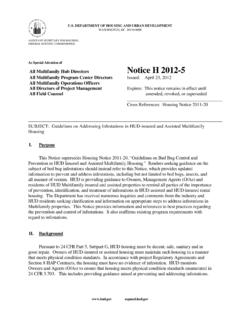Transcription of The Evidence Base for Improving School Outcomes by ...
1 COMMENTARYCOMMENTARYCOMMENTARYThe Evidence base for Improving SchoolOutcomes by Addressing the WholeChild and by Addressing Skillsand Attitudes, Not Just ContentAdele DiamondDepartment of Psychiatry, University of British ColumbiaIf we want the best academic Outcomes , the most efficient and cost-effective route toachieve that is, counterintuitively,notto narrowly focus on academics, but to also ad-dress children s social, emotional, and physical development. Similarly, the best andmost efficient route to physical health is through also addressing emotional, social,and cognitive wellness. Emotional wellness, similarly, depends critically on social,cognitive, and physical must always keep our eyes on the goals of education. If the goal of education isnot simply the memorization of facts, then we must stop focusing on the memori-zation of facts in our assessment measures, for what gets assessed is what gets em-phasized.
2 If success depends 90% on attitude and effort, only 10% on ability, wemust foster can-do attitudes and self-confidence in our students. If the goal of edu-cation includes clear reasoning, critical thinking, and creative problem-solving,EARLY EDUCATION AND DEVELOPMENT,21(5), 780 793 Copyright 2010 Taylor & Francis Group, LLCISSN: 1040-9289 print / 1556-6935 onlineDOI: regarding this article should be addressed to Adele Diamond, Department of Psy-chiatry, University of British Columbia, 2255 Wesbrook Mall, Vancouver, BC, Canada V6T : By: [University Of British Columbia] At: 16:57 19 October 2010we must give children, day in and day out, opportunities to solve problems on theirown, question assumptions. and reason their way to solutions. If the goal of educa-tion includes responsible, caring citizens, then we must give children opportuni-ties, day in and day out, to be responsible and caring, and we must ensure thatteachers are not so stressed that they are unable to provide caring role models forour human being is not just an intellect or just a body; every one of us isboth and we are not just cognitive and physical, but also emotional and so-cial.
3 We ignore any of those dimensions at our peril in raising and educatingchildren. Programs that address the whole child (cognitive, emotional, social,and physical needs) are the most successful at Improving any single as-pect for good reason. For example, if you want to help children with aca-demic development, you will not realize the best results if you focus only on ac-ademic achievement (though at first glance doing that might seem the mostefficient strategy); counterintuitively, the most efficient and effective strategyfor advancing academic achievement is to also nurture children s social, emo-tional, and physical needs. Donald Hebb famously responded, when askedwhich was more important for development, nature or nurture, by asking, Which contributes more to the area of a rectangle, its length or its width?
4 Contributors to this issue similarly are in unanimous agreement that it makeslittle sense to ask, Which is more important for healthy development (or evenmore narrowly, important for success in School and one s career), nurturingcognitive abilities or social and emotional ones? They are intimately inter-twined; nurturing both is of fundamental importance for the furtherance of ei-ther and to success in School , career, and life (see, , Nadeem et al., thisissue).Moreover, we need to keep our eye on the goal. The goal of education is not thememorization of obscure facts. Yet inevitably, that is what content-based multi-ple-choice tests assess. A second theme running through the papers in this volumeis the inadequacy, indeed harmfulness, of exclusive reliance on content-basedstandardized FUNDAMENTAL IMPORTANCE OF SOCIAL, EMOTIONAL,AND PHYSICAL HEALTH FOR COGNITIVE HEALTHThe core executive functions (working memory and inhibitory control [includ-ing attentional control, Rueda et al.)]
5 , this issue; and discipline]) are the fundamen-tal building blocks out of which the more complex executive functions, such ascognitive flexibility, critical thinking, creative problem-solving, and incisivereasoning are built (Diamond, 2006; Thompson & Gathercole, 2006). They relyCOMMENTARY781 Downloaded By: [University Of British Columbia] At: 16:57 19 October 2010on a network of brain structures, the kingpin of which is prefrontal cortex (Dia-mond, 2002).1782 COMMENTARY1 Perhaps it is appropriate to say something about the differences, similarities, and overlap betweenrelated concepts used by authors of papers in this special issue: executive functions, self-regulation( , Eisenberg, this issue), effortful control (Eisenberg, this issue; Rueda et al., this issue), executiveattention (Rueda et al., this issue), and working memory.
6 Executive functions is a term referring to a set of cognitive functions involved in the top-downcontrol of behavior in the service of a goal (Diamond, 2006; Espy et al., 2004; Hughes, 2005; Miyake etal., 2000; Pennington, 1997; Zelazo & Mueller, 2002). They are needed whenever going on auto-matic would be insufficient or detrimental. They include (a) inhibition at the level of attention and in-hibition at the level of action (such as selective attention [inhibiting distraction], staying on task despitetemptations not to [discipline], and giving the considered or appropriate response rather than the impul-sive one [self-control]) and (b) working memory (holding information in mind and working with it,such as relating what you just did to the response you received, what you learned last year to what youare hearing now, or what you read earlier in a sentence or a novel to what you are reading now; it also in-cludes doing mental arithmetic and holding in mind what you want to say or ask while you continue tolisten to a speaker).
7 Historically, executive functions have primarily been assessed directly from thechild s behavior, on arbitrary laboratory-based tests, and executive-function researchers have generallyfocused on emotions as a problem to be controlled through effort (Blair & Diamond, 2008). Self-regulation refers primarily to emotional control and regulation (Eisenberg, this issue; Eisenberg,Spinrad, & Eggum, 2010; Mischel, & Ayduk, 2002; Raver, 2004; Rothbart & Jones, 1998). To some extent,it overlaps with the inhibitory control component of executive functions, in that both self-regulation and ex-ecutive functions embrace controlling one s emotions, though even here executive-function researchershave focused more on the inhibition of thoughts, perceptions, and actions, and only more recently have in-cluded emotional control. Unlike the term executive functions, self-regulation also embraces the im-portance of motivation and alertness emotional responses to be encouraged.
8 Self-regulation researchersview emotions as equal partners in the learning process and in the achievement of one s goals. His-torically, self-regulation has primarily been assessed through adult ratings of children s behavior, ob-served over the course of time at home or in School , though of course there has also been direct empiricalobservation using, for example, the tasks of Mischel et al. (1989) and Kochanska et al. (2009). Effortful control, coined by Rothbart (Kieras et al., 2005; Posner & Rothbart, 1998; Rothbart,Ellis, Rueda, & Posner, 2003; Rothbart & Jones, 1998; Rothbart, Sheese, & Posner, 2007), refers to anaspect of temperament, a genetic predisposition, along a continuum to be predisposed to exercise in-hibitory control or self-regulation with ease ( , easily able to slow down or lower one s voice) versusfinding that harder or less natural.
9 Executive attention, coined by Posner (Posner & DiGirolamo, 1998; see also Fan et al., 2002;Rueda, Posner, & Rothbart, 2005), refers to the top-down regulation of implicit or explicit perception(endogenous attention) as opposed to alerting (maintaining a state of high readiness to attend to po-tential stimuli) and orienting (exogenous attention being pulled by a stimulus to attend to it). Onewould think that executive attention would correspond to the executive-function subcomponent ofinhibitory control at the level of attention ( , selective, focused, and sustained attention). Indeed,when assessed by measures such as the flanker task, where one is to focus on the center stimulusand ignore the flanking stimuli, it is indeed used in this way (Fan et al., 2002; Rueda et al., 2005).However, much confusion has been engendered by the overly broad use of the term executive atten-tion, even by someone as truly brilliant and beloved as Posner.
10 To my mind, attention refers to theregulation of the information we take in focusing on one thing rather than another and staying fo-cused allocating mental resources so one concentrates on one stimulus, or set of stimuli, rather thananother. Executive attention should not be used to refer to response inhibition (whether to press onDownloaded By: [University Of British Columbia] At: 16:57 19 October 2010 Our thinking and our brains suffer if we are lonely or feeling socially isolated,and that is particularly true of executive functions and the prefrontal cortex onwhich they rely (Cacioppo & Patrick, 2008). Feeling excluded or as if one does notbelong has been shown in controlled experiments to impair reasoning and deci-sion-making, decrease persistence on difficult problems, and impair selective at-tention in the face of distraction (Baumeister, DeWall, Ciarocco, & Twenge, 2005;Twenge, Catanese, & Baumeister, 2002).)








